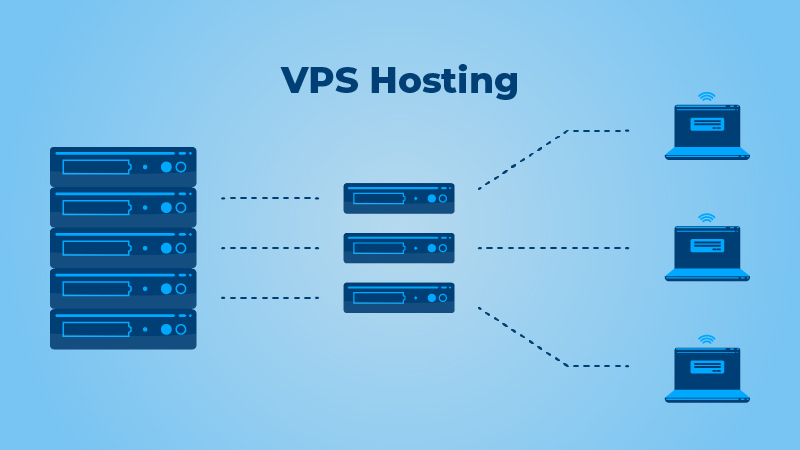
What is VPS Hosting? Understanding Guide for Beginners
Table of Contents
VPS is an excellent form of web hosting as it is affordable and highly efficient. If you have hosted your website on a virtual private server, you can be rest assured that your website data is safe and there are sufficient resources to carry out the functions of your website. Detailed knowledge about the virtual private server will help you in taking better decisions for your business when it comes to web hosting.
What Is a Virtual Private Server (VPS)?
A Virtual Private Server (VPS) is a virtualized server that mimics the functionality of a dedicated server within a larger physical server. In a VPS environment, a single physical server is partitioned into multiple virtual servers, each of which acts as an independent server with its own operating system, resources, and configuration.
How does VPS Hosting Work:

VPS hosting works through the use of virtualization technology, which allows a single physical server to host multiple virtual servers, each operating as an independent entity with its own resources and operating system. Here’s a step-by-step overview of how VPS hosting works:
- Physical Server: At the core of VPS hosting is a physical server, often referred to as the host server or the hypervisor. This is a high-powered machine with substantial resources like CPU, RAM, storage, and network connectivity.
- Virtualization Layer: The physical server runs virtualization software, known as a hypervisor. The hypervisor is responsible for creating and managing multiple virtual environments on the same physical hardware. Common hypervisors include VMware, KVM, Hyper-V, and others.
- Virtual Servers (VPS): The hypervisor divides the physical server into multiple virtual servers, also known as Virtual Private Servers (VPS). Each VPS operates independently, with its own dedicated portion of resources, an isolated operating system, and configurable settings.
- Resource Allocation: The resources of the physical server, such as CPU cores, RAM, disk space, and bandwidth, are divided among the virtual servers. Each VPS has its allocated resources, and these allocations can often be adjusted based on the hosting plan or user requirements.
- Operating System: Each VPS runs its own operating system, which could be Linux (e.g., Ubuntu, CentOS) or Windows Server, depending on the user’s preference and requirements. Users have the flexibility to install and configure software, manage security settings, and perform other system-level tasks on their VPS.
- Isolation: Virtualization ensures that each VPS is isolated from others on the same physical server. This isolation means that activities, configurations, or issues on one VPS do not impact the others, providing a higher level of security and stability.
- Access and Control: Users typically have remote access to their VPS, allowing them to manage it through a control panel, command line interface, or other management tools. This enables users to install applications, configure settings, and perform administrative tasks.
- Scalability: VPS hosting is scalable, allowing users to easily adjust their resources (such as CPU, RAM, and storage) based on changing requirements. This scalability makes VPS hosting a flexible solution that can adapt to the evolving needs of the user.
Pros And Cons Of VPS Hosting

A virtual private server provides dedicated resources and greater control over server configuration compared to shared hosting, at a lower cost than dedicated hosting. VPS strikes an optimal balance of affordability, customization, and guaranteed performance for many growing websites and web applications.
Pros of using a VPS server:
- Cost-effectiveness: VPS costs less than dedicated hosting but delivers better performance than shared hosting. VPS is a budget-friendly option for sites outgrowing shared servers.
- Customization and control: VPS users can fully optimize and customize server settings, and install software. This level of control is ideal for sites with specific configuration needs.
- Scalability: It’s easy to scale VPS resources like CPU cores, RAM, and storage as site traffic increases. Sites can upgrade their VPS plan as needed to accommodate growth.
- Dedicated resources: VPS provides guaranteed CPU, RAM, bandwidth, and disk space. Resources are not shared, ensuring full control and reliable performance.
- Enhanced security: VPS isolates sites from one another for added security compared to shared hosting’s open environment.
- Support and maintenance: Many VPS plans include technical support and management options to maintain the server.
Cons of using a VPS server:
- Technical expertise required: Managing and optimizing a VPS requires strong technical skills. Those without server admin experience may struggle.
- Resource allocation problems: Improper resource allocation by the hosting provider can impact VPS performance.
- Limited hardware control: Users don’t control the physical server since VPS virtualizes hardware.
Key Advantages of VPS Hosting

VPS hosting offers several key advantages, making it a popular choice for individuals and businesses with specific hosting needs. Here are some of the key advantages of VPS hosting:
- Cost-Effective: VPS hosting provides a cost-effective solution that falls between shared hosting and dedicated hosting. Users can enjoy the benefits of a dedicated environment without the higher costs associated with a dedicated server.
- Isolation: Each VPS operates independently of others on the same physical server. This isolation ensures that the activities and issues on one VPS do not affect the performance or security of others, providing a higher level of stability.
- Dedicated Resources: Users get dedicated resources such as CPU, RAM, and storage. Unlike shared hosting, where resources are shared among multiple users, a VPS allocates specific amounts of resources to each virtual server, ensuring consistent performance.
- Customization and Control: VPS hosting gives users full control over their virtual server. Users have root or administrator access, allowing them to install and configure software, manage security settings, and make system-level changes according to their specific requirements.
- Scalability: VPS hosting is scalable, allowing users to easily upgrade or downgrade their resources as needed. This flexibility is beneficial for businesses with changing hosting requirements, providing the ability to adapt to increased traffic or changes in resource needs.
- Improved Performance: Compared to shared hosting, where multiple users share the same server resources, VPS hosting offers better performance because each virtual server has its allocated resources. This is particularly advantageous for websites or applications with higher resource demands.
- Enhanced Security: The isolation of VPS instances provides a higher level of security compared to shared hosting. Since each virtual server operates independently, security breaches or vulnerabilities on one VPS are less likely to impact others.
- Operating System Choice: Users can choose their preferred operating system, whether it’s Linux distributions (e.g., Ubuntu, CentOS) or Windows Server. This flexibility allows users to select the environment that best suits their application or website requirements.
- Root/Admin Access: VPS hosting typically provides root (for Linux) or administrator (for Windows) access. This level of access enables users to have complete control over the server’s configuration, allowing for advanced customization and optimization.
- Reliability and Stability: The isolation of VPS instances contributes to increased reliability and stability. Since each virtual server is independent, issues on one VPS are less likely to affect others, resulting in a more stable hosting environment.
Conclusion:
In the ever-evolving digital landscape, understanding the fundamentals of Virtual Private Servers (VPS) is an asset for individuals and businesses alike. By offering a balance between shared hosting and dedicated servers, VPS provides enhanced performance, customization, and control at an affordable cost. Selecting the right VPS hosting provider and setting up your virtual server with care can lead to a seamless online presence, improved user experiences, and the ability to scale your resources as your digital ventures expand. As technology continues to advance, embracing VPS hosting may well be the key to unlocking your website’s full potential in the digital realm.
